|
|
|
Sort Order |
|
|
|
Items / Page
|
|
|
|
|
|
|
| Srl | Item |
| 1 |
ID:
183864
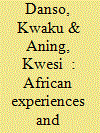

|
|
|
|
|
| Summary/Abstract |
Deconstructing International Relations (IR) episteme acknowledges its generation of power imbalances in security knowledge that relegate African experiences to the margins of global politics. Central to this process of relegation is a pervasive ‘methodological whiteness’, which, while eliding coloniality and racism, projects white experience as a universal perspective. Accompanying this Eurocentric bias has been the intrusive projection of the Weberian state as the most effective site for security governance and conflict prevention on a continent with states that are characterized by a hybridity of political orders, which deviate substantially from the ideal-type state that they seek to mimic. Not only has this resulted in disastrous policies in many parts of Africa, but critical questions arise as to the relevance of conventional IR and security studies as neutral sites for dispassionate knowledge production and policy-making on African security, thereby necessitating alternative perspectives. This article reflects on the ways in which IR and security studies have been responsible, in part, for the production of a racialized mode of security knowledge generation that obfuscates the security policies and experiences of people in African locales. It draws on insights from post-colonial discourses and the episteme of alternativity to explore how the study of events and processes in Africa in a theoretically conscious manner could advance IR scholarship as a whole. It contends that incorporating African experiences as they manifest through hybrid security orders can broaden the empirical base for IR theorizing about security since they offer another perspective outside the conventional western assumptions and experiences.
|
|
|
|
|
|
|
|
|
|
|
|
|
|
|
|
| 2 |
ID:
183870


|
|
|
|
|
| Summary/Abstract |
This article wrestles with the question of ‘national’ borders in racial capitalism. We do so through an examination of border and capitalist corridors. We focus particularly on the Israeli border, branded and then sold to the rest of the world by the epistemic community of border-makers and interlocutors. In tracking the Israeli border and showing the implication of the experts and their markets, we ask how the border reflects and is refracted through a global order organized by the twin dictates of racism and capitalism. We are especially interested in how racialized processes of bordering, ostensibly governed by national exigencies, are transplanted on to other contexts. Two points emerge from this: in the first instance, we ask who and what enables this movement of the border. And in the second, we interrogate which logics and practices are transplanted with the border, as it is reproduced and seemingly fixed in a new place. We examine the violent ontologies that give shape and reputation to Israel's high-tech border industry, which has become a model for the ever-growing global homeland security industry. We ask: has Israel's border become an exportable commodity and who are the actors who have enabled this ‘achievement’? Related to this, what sort of occlusions and structural violence does the fetishization of the Israeli border rely on?
|
|
|
|
|
|
|
|
|
|
|
|
|
|
|
|
| 3 |
ID:
183869
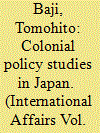

|
|
|
|
|
| Summary/Abstract |
This article examines Japanese colonial policy studies (shokumin seisaku gaku) with a particular focus on its relationship with the distinct region of ‘Nan'yo’ (the South Seas). Specifically analysing the works of Takekoshi Yosaburo (1865–1950), Nitobe Inazo (1862–1933) and Yanaihara Tadao (1893–1961), it seeks to uncover the ways in which the exponents of this study area accounted for Nan'yo based on their conceptions of race. It also shows how they inflicted envisaged racial hierarchies on the southern Pacific and how such attempts were related to colonial policy debates behind the practice of Japanese imperialism. Part of the findings point out that Takekoshi's and Nitobe's comparable projections of strict racial hierarchies on the Malays served to justify the southward colonization of the Japanese. Yanaihara's depiction of Nan'yo islanders as radically underdeveloped was tailored to championing Japan's sustained espousal of the League Mandate. The article argues that their accounts of Nan'yo formed part of a transnational knowledge chain about colonial and racial victimization. Like their western counterparts including Gustav Le Bon, Paul Leroy-Beaulieu, Paul S. Reinsch and J. A. Hobson, they built purported racial pyramids with the tropical areas at their bottom, the bulk of which correspond to today's global South. They have been accomplices in this colonial present.
|
|
|
|
|
|
|
|
|
|
|
|
|
|
|
|
| 4 |
ID:
183871


|
|
|
|
|
| Summary/Abstract |
There is a state-centrism in the way insurgencies are conceived in international politics. Herein, policy and practice targeting insurgencies draw on the long-established scholarly perception that war-making is the vocation of the state and that the violence of non-state insurgent factions is a source of insecurity. However, this state-centrism also has a colonial legacy and is an outgrowth of the colonial hostility towards anti-colonial factions. In this article, I establish the colonial roots of the current standing of insurgencies in international politics. Empirically, I focus on the European Union's (EU) peacebuilding efforts in the occupied Palestinian territories (oPt). These efforts are largely premised on the notion that state-building is synonymous with peacebuilding and are focused on furbishing the state-like institutions of the Palestinian Authority (PA). But, in doing so, this manner of peacebuilding also replicates the scholarly antagonism towards non-state armed factions and, with it, the logic of colonial counterinsurgencies, as it de-legitimizes the varied forms of insurgent politics that occur outside the institutional limits of the PA. In the end, it is not entirely surprising that this mode of engagement has not secured peace—especially since it is premised on a certain antagonism towards insurgent politics. Therefore, I conclude, a substantial understanding (and incorporation) of the political grievances that drive insurgent politics, and their appeal, is essential for effective peacebuilding.
|
|
|
|
|
|
|
|
|
|
|
|
|
|
|
|
| 5 |
ID:
183874


|
|
|
|
|
| Summary/Abstract |
This article investigates local endeavours for Holocaust memory in post-apartheid South Africa in their relation to global memory imperatives that are, among others, produced by supranational organizations such as UNESCO and the International Holocaust Remembrance Alliance. Drawing on a larger case-study on globalized memory, I analyse to what extent a generalized mnemonic framework is reflected in South Africa's 2007 curriculum reform, namely its inclusion of the Holocaust and subsequent memory politics. In order to illuminate the coloniality of memorialization, I trace the epistemic location of the narrative that suggests that Holocaust memory nourishes democratic values and human rights—maybe even more so than local memories of violence and oppression such as colonization and apartheid. In this regard, I found that while many activists for Holocaust memory continuously and sometimes uncritically advocate for its global implementation, a decolonial perspective enables us to understand the power dynamics constitutive of universal moral norms around Holocaust memory that tacitly transmit global demands to local contexts. I therefore suggest that, within the global colonial matrix of power, a universally advised practice of memorializing the Holocaust to specific ends can be regarded as a technique of governmentality, because it risks limiting utopian thought beyond the Euro-modern paradigm.
|
|
|
|
|
|
|
|
|
|
|
|
|
|
|
|
| 6 |
ID:
183873
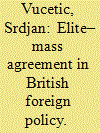

|
|
|
|
|
| Summary/Abstract |
Thirty years ago, William Wallace likened British foreign policy to a musical tug-of-war between the ‘Anglo-Saxons’ and ‘Europeans’, attributing ‘all the best tunes’ to the former. This article revisits Wallace's thesis and its main concept: national identity. It finds that Wallace was right to draw attention to the power of the ruling elite to shape Englishness and Britishness. However, the article also finds that ‘global’ foreign policy ideas were never the exclusive province of a segment of the British elite. Rather, they circulated in English and more broadly British society writ large, reflecting and reinforcing deep-seated, even unselfconscious, agreements between both ‘Anglo-Saxon’ and ‘European’ elites on the one hand, and much of the mass consumer public on the other. It follows that the constraints posed on possibilities of foreign policy change were always greater than Wallace had suggested; that a ‘lesser’ British foreign policy that was, and still is, so hard to imagine for the British is significant for analysis of dynamics of ‘western’ knowledge production that come under critique in this special issue. But rather than focusing exclusively on elites, critical analyses of knowledge exchange should be attuned to popular common sense, too.
|
|
|
|
|
|
|
|
|
|
|
|
|
|
|
|
| 7 |
ID:
183872


|
|
|
|
|
| Summary/Abstract |
This article situates the subject of the academic–practitioner (AP) exchange within an International Relations-orientated critique of the imperial dynamics of counterterrorism practices and racial subjugation. It uses an analytical framework that upholds the significance of racial hierarchy to knowledge production. A key contribution of this article is to situate the AP nexus within the circumstances of liberal democratic counterterrorism regimes, to demonstrate how race becomes meaningful to the knowledge that is produced about Islamophobia. The main argument of this article is that in present policy debates concerning the existence of systemic racism, one of the mechanisms enabling counterterrorism practitioners to regulate the AP exchange is that of institutionalized whiteness. Exploring two scenarios of AP exchanges in the United Kingdom and Canada, where counterterrorism practitioners were challenged to reconcile with academic explanations of Islamophobia as a systemic issue, this article uses colour-line inspired critiques of white logic to identify instances where anti-racist knowledge was subjugated in the name of imperialism. The article finds that in each scenario discussed, practitioners demonstrate trajectories of white logic by contesting the suitability of anti-racist knowledge put forward by academics, on the basis of racial hierarchy and self-aggrandizement. It concludes by discussing how a lack of practitioner–academic consensus continues to affect the dissemination of knowledge concerning systemic racism, thus prompting considerations of what this means for an anti-racist future.
|
|
|
|
|
|
|
|
|
|
|
|
|
|
|
|
| 8 |
ID:
183863


|
|
|
|
|
| Summary/Abstract |
Ten years on since the Arab uprisings we are in a position to assess how the nexus between knowledge, discourse and practice had a bearing on the trajectory of the protests. They represented hope and change for millions of Arabs in the region, but to what extent was that the case for onlookers in Europe and the US, and did western discourse on events in the Middle East matter? While the toppling of longstanding dictators was met with jubilation by Arab populations, it conversely created anxiety and fear in many western governments. This was reflected in the shift from an initially celebratory discourse in western commentary to disappointment, pessimism and disavowal of the uprisings. Within a year, op-eds and academic articles were asking whether the ‘Arab Spring’ had turned into an ‘Islamist winter’, reverting to Orientalist narratives about the inevitability of conflict, bloodshed and sectarianism in the Middle East. I argue this discourse had implications for the outcome of the uprisings as ‘latent Orientalism’ translated into ‘manifest Orientalism’ and western states hesitated to support opposition groups they initially encouraged and emboldened. I begin the article with a study of western discourse in the first year of the uprisings, which I then situate within a long durée history of western policy and representation of the Middle East. In the final sections I consider the role of scholarship and think tanks as mediators of Orientalist discourse.
|
|
|
|
|
|
|
|
|
|
|
|
|
|
|
|
| 9 |
ID:
183866
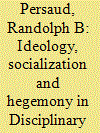

|
|
|
|
|
| Summary/Abstract |
This article argues that Disciplinary International Relations (DIR) does not only explain international affairs, but it also socializes and hegemonizes publics and professionals into an ideological worldview consistent with the interest of states that underwrite the world economic and security order based on hegemonic liberalism. Considerable emphasis is placed on tracing the continuities between the early theorization of IR in the United Kingdom and the United States, and the contemporary academic/foreign policy/security ‘complex’ dedicated to the maintenance of a hegemonic world order. The article demonstrates that the call for a greater theory–policy nexus in international affairs is redundant because leading American scholars double up as policy-makers, either directly or through other avenues such as consultancies. Some of the most prominent IR scholars, such as Michael Doyle, John Lewis Gaddis, Samuel Huntington, G. John Ikenberry, Stephen Krasner, Theodore H. Moran, Joseph Nye and Anne-Marie Slaughter, among others, have served in high-level positions in the United States foreign policy and security apparatus. The article also shows the ways in which in the early days of IR theorizing in the UK, scholars such as Lionel Curtis, Alfred Zimmern and Norman Angell doubled as staunch defenders of the British Empire, albeit in the language of liberal internationalism.
|
|
|
|
|
|
|
|
|
|
|
|
|
|
|
|
| 10 |
ID:
183861
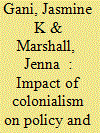

|
|
|
|
|
| Summary/Abstract |
Is there an academic–policy divide, and does that gap need to be bridged? For decades, International Relations (IR) scholars have reflected on their roles and responsibilities towards the ‘real world’, while policy-makers have often critiqued the detachment of academic research. In response, there have been increased calls for academics to descend from their ‘ivory tower’. However, the articles in this 100th anniversary special issue of International Affairs interrogate this so-called theory–policy divide and problematize the exchange of knowledge between academics and practitioners, highlighting the colonial underpinnings of their historical entanglements. In this introductory article we bring together the core arguments of the special issue contributions to delineate three prominent dynamics in the academic–practitioner nexus: the role of academia as a supplier of knowledge for colonial policies; the influence of imperial practice and policy-makers in shaping IR and academic knowledge production; and the contestation from academics and/or practitioners against racial hierarchies in knowledge production and policy-making. Confronting the exclusions, amnesias and denials of colonialism in the theory and practice of International Relations is the necessary first step in any process of repair towards a more just and viable politics.
|
|
|
|
|
|
|
|
|
|
|
|
|
|
|
|
| 11 |
ID:
183868


|
|
|
|
|
| Summary/Abstract |
Why do nuclear weapon-free zones (NWFZs)—areas which prohibit nuclear weapons—emerge in some contexts, and not others? Focusing on the African case, this article introduces the concept of ‘obedient rebellion’ to explain the African NWFZ's early conception. ‘Obedient rebellion’ is an attitude of ambivalence toward global nuclear order. To newly-decolonizing African states, the African NWFZ symbolized both postcolonial anti-nuclear solidarity and nuclear responsibility; it represented both ‘obedience’ to—and ‘rebellion’ against—global nuclear order. This ambivalence, between ‘obedience’ and ‘rebellion’, paradoxically accommodated multiple conflicting audiences simultaneously, thereby stabilising the zone. The African NWFZ's ambiguous meanings made it viable, even though those meanings conflicted. The zone's early conception offers insight into the complex, contending forces that continue to bind the world's NWFZs—and indeed nuclear order itself—to the present. NWFZs epitomize the tensions which stabilize nuclear order: between sovereign equality and nuclear inequality; between local solidarities and global loyalties; and between contestation and compromise. At first, these tensions seem to imperil NWFZs; in fact, these tensions stabilize NWFZs. The African zone also poses challenges to the African blind spot that continues to exist in International Relations theory.
|
|
|
|
|
|
|
|
|
|
|
|
|
|
|
|
| 12 |
ID:
183862
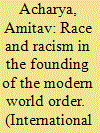

|
|
|
|
|
| Summary/Abstract |
While race existed as a cultural marker in earlier history, a mutually-reinforcing link between racism, slavery and empire is a distinct product of western Europe and the US-led world order. Yet, mainstream scholarship on International Relations has obscured the question of race or worse, legitimized its exclusion in discussions of world order-building. At the same time, demand for racial equality from anti-colonial forces presented an alternative and inclusive conception of world order. The first part of this article offers a brief discussion of concepts of race, racism and world order. The next part examines how racist ideas and norms created exclusionary frameworks and approaches of world order, such as the European ‘standard of civilization’ principle. The third part looks at the role of racism in the emergence of the American-led world order, including US President Woodrow Wilson's rejection of the ‘racial equality’ principle in the League of Nations Charter, the privileging of ‘sovereign equality’ over ‘racial equality’ in the UN Charter, and the scant attention given to the link between colonialism and denial of human rights in the Universal Declaration of Human Rights. Yet, anti-colonial leaders and conferences, especially the 1955 Bandung Conference, integrated ‘national sovereignty, racialism and colonialism’, and demanded racial equality as a fundamental human right. The final part cautions against the dangers of complacency and compartmentalizing the study of race and racism, and calls instead for viewing racism as an inter-linked global challenge, hence integral to the emerging research agenda of Global International Relations.
|
|
|
|
|
|
|
|
|
|
|
|
|
|
|
|
| 13 |
ID:
183867
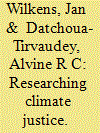

|
|
|
|
|
| Summary/Abstract |
This article addresses the broader question of the special issue by reflecting on the coloniality of knowledge production in a context of global climate governance. Drawing on the rationale of the special issue, we highlight key dynamics in which knowledge shape climate policies and propose a decolonial approach at the nexus of academic knowledge production and policy formation by accounting for diverse ways of knowing climate justice. To this end, the article asks how to develop a decolonial approach to researching climate justice in order to identify the meaning-in-use of climate justice by affected people in what we describe as sensitive regions of the Arctic and the Mediterranean. To this end, the article develops a research design that accounts for diverse ways of knowing. The article proceeds as follows: first, we will discuss how diverse ways of knowing are related to global climate governance and climate justice; second, we outline our practice-based research framework that addresses research ethics, decolonial approaches and norm contestation; and third, we discuss how our approach can inform not only the co-production of research in climate governance, but also current debates on climate justice.
|
|
|
|
|
|
|
|
|
|
|
|
|
|
|
|
| 14 |
ID:
183875


|
|
|
|
|
| Summary/Abstract |
Before 1914 scholars of international thought frequently relied on racist arguments, yet the ways that race was used varied widely from author to author. This article charts the way that race was used by two groups of Anglophone writers. The warriors used biological arguments to construct views of international affairs that relied on racist analysis. Pacifists might have used racist language that relied more on cultural prejudices, and would often base their more progressive views of international affairs on the idea of a civilizing mission. Using A. T. Mahan and Brooks Adams as exemplars of the warrior approach, and Norman Angell and H. N. Brailsford for the pacifists, I argue that race and racism play an important part in international thought before the First World War. This racism was directed at the colonized in the global South, Indigenous peoples in settler colonial states, and Jews in the global North. This use of race and racism in pre-First World War international thought has implications for how we view the development of International Relations today. It is not just statues and stately homes that require a thorough reassessment of attitudes to race, but also our understanding of the progression of ideas in international thought.
|
|
|
|
|
|
|
|
|
|
|
|
|
|
|
|
| 15 |
ID:
183865


|
|
|
|
|
| Summary/Abstract |
In 2010, as the Afghan government announced its intention to begin a formal peace process, there were numerous calls for women to have a seat at the table. Both mainstream and critical discourse on women and the peace process in Afghanistan, however, relied on the production of essentialized subjectivities which failed to recognize the political and social complexity of women's lives, diminished their intellectual contributions and silenced their voices. This article challenges the simultaneous hyper-visualization and silencing of Afghan women by both Afghan and international actors. Drawing on feminist and decolonial theory, we examine the ways in which the colonial mechanisms of intervention, patriarchy and the global hierarchies of knowledge production worked in tandem to marginalize Afghan women while upholding them as agents of peace. The article brings together findings from three participatory research projects on women and peace, which took place from 2010 to 2014 across eight provinces in Afghanistan. A prismed view of the participants' intersectional realities is constructed, which highlights diverse positionalities and articulations of peace, the social and political cleavages, and differentiated obstacles to their involvement in the peace and reintegration process. The concluding remarks emphasize the relevance of these findings for Afghanistan at the time of publication.
|
|
|
|
|
|
|
|
|
|
|
|
|
|
|
|
|
|
|
|
|